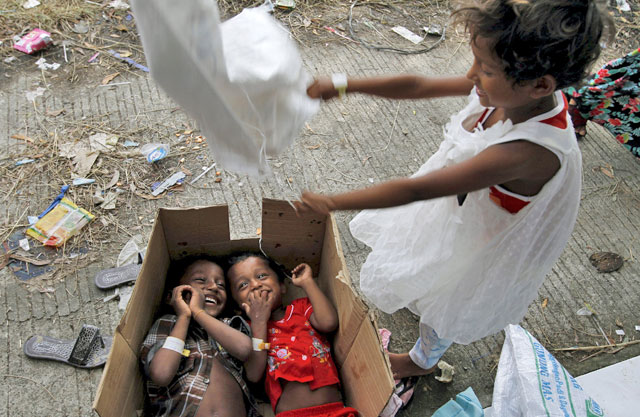KUALA LUMPUR — For hundreds of migrants stranded at sea in sinking boats, the first helping hand came not from governments but from fishermen who towed them to safety. The desperation of migrants from Myanmar and Bangladesh has not compelled neighbouring countries to take them in, but has inspired compassion — and pleas for help — from ordinary people across Southeast Asia.
Sympathetic Malaysians have launched donation drives to help feed migrants who have flooded ashore in the past two weeks. In Indonesia, where fisherman rescued three boats last week and saved 900 lives, villagers have donated clothing and home-cooked meals.
Aid groups estimate that thousands more migrants — who fled persecution in Myanmar and poverty in Bangladesh — are stranded in the Andaman Sea after a crackdown on human traffickers prompted captains and smugglers to abandon their boats.
But more than two weeks into the spiralling humanitarian crisis, the stance of Southeast Asian governments remains unchanged — none wants to take the migrants in, fearing that accepting a few would result in an unstoppable flow. A political cartoon in Thailand's The Nation newspaper on Monday summed up the official reaction, showing a boatload of Muslim Rohingya refugees being kicked back to sea by people on the shores of Thailand, Malaysia, Indonesia, Myanmar and Bangladesh.
"On the one hand, we're seeing governments quibbling and struggling to find ways to deal with these boat people. But on the other hand, it's encouraging to see that the people in this region have responded very generously to these boat people," said Vivian Tan, a Bangkok-based spokeswoman for the UN refugee agency, UNHCR.
"The public response has been overwhelming and governments really need to follow this example and let people disembark as soon as possible," Tan said.
One prominent Islamic scholar in Malaysia noted that the government is still searching for a Malaysia Airlines plane believed to have crashed at sea over a year ago, "while those who are still alive, we leave to die out at sea”.
"Where is our humanity?" Asri Zainal Abidin, a state mufti in Malaysia, wrote on his Facebook page.
Navy ships from Malaysia, Thailand and Indonesia intercepted boats last week packed with desperate, hungry migrants, giving them food and water and then sending them away — a move that drew strong international criticism. The UN warned that pushing away boats of starving people could create a crisis of "floating coffins”.
It also sparked outrage in Malaysia, a predominantly Muslim country, where sympathetic citizens and Muslim groups have launched donation drives to collect food, clothing and medical aid for a boatload of more than 1,100 migrants who landed at a Malaysian island on May 10 and are being held at a detention camp.
Another prominent Malaysian, Marina Mahathir, a social activist and daughter of former prime minister Mahathir Mohamad, issued an appeal last week for anyone with seaworthy boats to send aid to the migrants still at sea.
"Our chief concern is those still out at sea because this is a real humanitarian crisis," she said. "We need to provide some sort of solution. I don't think we can wash our hands of this."
An online petition is calling on the Malaysian government to put humanity before politics. "We the people want incoming migrants who have been abandoned at sea by traffickers to be rescued and cared for by our elected Malaysian government," it says.
Malaysia is the current chair of the 10-country Association of Southeast Asian Nations, and has called for a meeting of the foreign ministers of Malaysia, Indonesia and Thailand on Wednesday.
But Malaysian officials have said they will not take in more refugees. Malaysia is the desired destination for most of the migrants — it has already hosted more than 45,000 Rohingya over the years, according to the UN — but now says it can't accept any more.
The Rohingya Muslims have faced decades of state-sanctioned discrimination in Myanmar, which is predominantly Buddhist. In the past three years, Rohingya were targeted by violent mobs of Buddhist extremists, leaving hundreds dead and sparking an exodus of more than 120,000 people, according to the UN's refugee agency.
The UN has called the Rohingya one of the most persecuted groups in the world.
In Indonesia, the world's most populous Muslim nation, officials have appealed to villagers on loudspeakers not to get too close to the migrants who were towed ashore in eastern Aceh province by fisherman, fearing they could spread disease.
But villagers have ignored the orders. Hundreds have thronged the two warehouses where the migrants have been housed since their Friday arrival, bringing rice, instant noodles, clothing and even some home-cooked meals.
"We have to help them, because they are our brothers," said Hayaturrahman Djakfar, who came with a group that donated sarongs, towels, headscarves, children's clothes and food. "And because they are struggling for a better life and protection. There is no reason not to help them."
